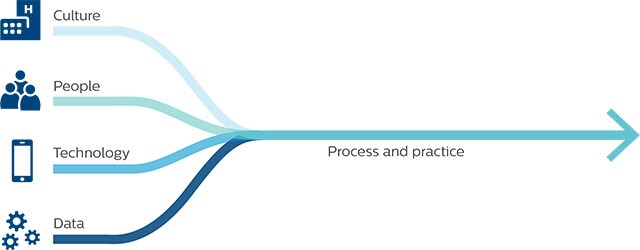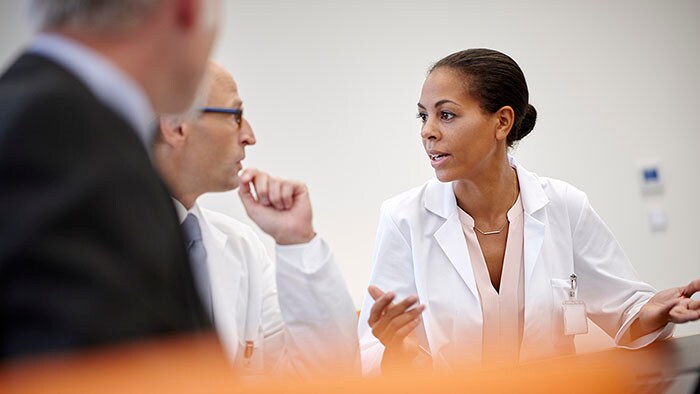Optimizing processes for greater efficiency
With the expectation of a hospital-wide installation of new telemetry equipment, Huntsville Hospital wanted to conduct a current-state assessment of their telemetry monitoring program so processes could be optimized and in place when the new equipment arrived. Huntsville Hospital and Philips set out together to evaluate the central monitoring unit (CMU) and telemetry monitoring and alarm management practices to identify improvement opportunities in current processes so the hospital could act on improvement recommendations prior to installation. As a result of the assessment, Philips consultants identified 23 opportunities and recommendations for performance improvement, which were detailed and presented to hospital leadership.
With a centralized monitoring room, the noise level alone is often overwhelming to technicians. The recommended changes made an immediate difference in the noise level that was noticed and felt by all, making for a much healthier and safer work environment. We feel patients are also much safer because the technicians can focus on true and valid alarms and limit the number of notifications to RNs thereby reducing their workload.”
Wendy Cantrell, MSHR Manager, Telemetry Monitoring
Huntsville Hospital
Our approach
Elements of the effort included:

Recommendations
Numerous challenges such as lack of telemetry order guidance, poor alarm customization, and alarm fatigue were identified and considered during the course of the engagement. Based on these findings, Philips consultants identified 23 specific opportunities for improvement. The top 10 being:
Next steps
Upon completion of the engagement, Huntsville Hospital decided to move forward with the recommendations. When the equipment upgrade is ready for implementation, Huntsville Hospital’s telemetry monitoring program will be positioned to optimize the new technology.
The assessment report allowed us to make changes based on true data and not merely what we “thought” were our problems and concerns.”
Wendy Cantrell, MSHR Manager, Telemetry Monitoring
Huntsville Hospital
* Results are specific to the institution where they were obtained and may not reflect the results achievable at other institutions.

Huntsville Hospital serves as the regional referral center for North Alabama and Southern Tennessee and is a teaching facility for the University of Alabama’s Family Practice and Internal Medicine residency programs. It is also home to one of only three statewide Level I Trauma Centers.
Meet our team

John Davanzo, MBA, BSN, RN, CEN, EMT-P, NEA-BC, FACHE Consulting Manager
John brings expertise in hospital operations, workflow, and process redesign. He is a regular regional and national presenter on healthcare topics including process and resource efficiency as well as use of simulation in healthcare. He is a Fellow in the American College of Healthcare Executives. His clinical expertise includes emergency care, pre-hospital care, and pediatric and adult ICU.
You are about to visit a Philips global content page
Continue
Lisa Pahl, RN, BSN, MSN Practice Lead, Acute and Critical Care Consulting
Healthcare Transformation Services, Philips
Lisa is a recognized expert in alarm fatigue and alarm management. She is a member of the AAMI Healthcare Technology Safety Institute’s national Clinical Alarms Steering Committee and often presents on alarm management. Her clinical expertise spans Adult Critical Care, NICU and PICU, Telemetry, ED, OR, and PACU and past nursing positions included Critical Care, Telemetry/Step Down, Med/Surg, Float Pool, and Home Health.
You are about to visit a Philips global content page
ContinueRecent success
Statement about download and contact us.



